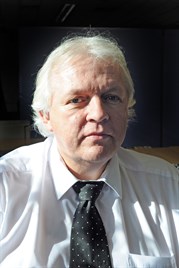 Peer review: Nigel Harris
Peer review: Nigel Harris
Managing Editor & Events Director,
RAIL and RailReview
As Managing Editor of RAIL I’ve covered four General Elections (1997, 2001, 2005, 2010), and in none of them was railways a key issue. In terms of both general strategy and hand-to-hand battle tactics, I expect the same to apply in 2015 - but that won’t stop a lot of noise. Indeed, it is already well under way, with Shadow Transport Secretary Michael Dugher firing the first shots.
His comments about the franchise system being destined for “the bin”, with work on scrapping the system beginning within ten days of a Labour majority, are headline-catching. But in my opinion, they are flash-bang distraction grenades, rather than real political artillery shells.
As Paul Prentice so accurately points out, whatever headline policies are peddled before the ballot, they are often later “discreetly shelved or even forgotten”. Given that scrapping franchising would have a very high cost, there’s no way the Treasury would sanction such a plan, in my view.
The same applies to the superficially appealing but actually barmy notion of a public sector bidder such as Directly Operated Railways - any genuinely independent bid would cost the taxpayer around £5 million every time the dice was thrown. And even if the Treasury did nod Dugher’s plans through, the notion that Shadow Chancellor Ed Balls has given Dugher an open cheque for his plans is fanciful to say the least. At least £50m would be needed just to enable a genuinely independent public sector bid for the eight franchises due to be renewed in the next 18 months.
Labour has a very long tradition of dangling imaginary carrots before the electorate. Exactly 19 years ago, in RAIL 272, I interviewed Shadow Transport Secretary Clare Short, who echoed Labour leader Tony Blair’s commitment to a “publicly owned, publicly accountable railway”. Having won the 1997 election with a big majority, Labour quietly abandoned its promise and spent the next 13 years in power seeking to enhance and improve a privatisation that its Transport politicans still described as “botched”.
Labour is not alone, of course, in flipping in search of votes. Flavour-of-the-month UKIP, and its darling of the headline writers, leader Nigel Farage, committed vociferously to not merely High Speed 2 but an entire 300kph network in 2010. UKIP now opposes HS2 and even Farage describes his own 2010 manifesto as “drivel”.
The Conservatives are also at it. Having single-mindedly pursued austerity in the context of endless demands for efficiency, value for money and innovative thinking, Rail Minister Claire Perry recently said that she will not countenance “London’s cast- offs” in replacing Northern Pacers. Vivarail’s completely re-engineered and refurbished D-trains are thereby rubbished at a stroke, when they not only answer all the Government’s stated demands, but also deliver what the McNulty Review required.
More annoying to voters than what they see as crass hypocrisy, is that they are regarded as being too dim to see through this political grandstanding. But even more corrosive in terms of the costs of the railway, investors, bankers and other supporters grow cautious and wary of the increased risk. That risk is priced into the cost of developing our railways - and taxpayers end up paying.











